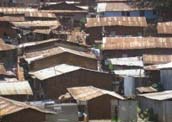 More than 1 billion people across all continents live in slums. These communities, characterized by inadequate housing, lack of basic services, overcrowding, and high levels of violence and insecurity, are also places where residents live, work, and raise their children. Yet, many governments are failing in their duty to protect the rights of these people.
More than 1 billion people across all continents live in slums. These communities, characterized by inadequate housing, lack of basic services, overcrowding, and high levels of violence and insecurity, are also places where residents live, work, and raise their children. Yet, many governments are failing in their duty to protect the rights of these people.
Global slum populations are growing at alarming rates. Disinvestment in rural areas, conflict, natural disasters, climate change, forced evictions and corporate land grabbing continue to force people to migrate to cities where affordable housing is scarce.
People living in slums experience a staggering number of human rights violations. They are routinely denied their right to adequate housing, safe water, sanitation and drainage, electricity, health and education, and face the constant threat of police and gang violence, and forced eviction.
Slum residents pay disproportionately high rents because rent control legislation is rarely imposed in areas considered by the authorities to be “unregularized”. Access to justice is denied because of discrimination and residents have no say in the upgrading of homes or services.
The absence of health facilities and schools within many slums severely restricts access to health care and education. Malnutrition and child mortality rates in slums often match rural areas.
Many urban residents in the developing world lack legal papers guaranteeing security of tenure, increasing their susceptibility to forced eviction and restricting access to services and formal employment. Often, people who live in slums without official documentation are also denied the right to vote.
Forced evictions are a violation of human rights and often result in people losing their possessions, social networks, and access to work and services. Mass forced evictions are increasingly carried out by governments so that slums can be cleared for urban development, city beautification or national projects, such as the Beijing Olympics.
Women are particularly vulnerable in slums, where lack of facilities place them at greater risk of sexual assault and harassment, and where the reporting of domestic violence is often not treated seriously by police. Property law also frequently discriminates against women.
The negative perceptions of people living in slums have contributed directly to a serious deterioration in public security in these communities. In Brazil and Jamaica, this failure by the state has allowed criminal gangs and drug factions to dominate virtually every aspect of life.
Governments have failed to address these issues at both national and international levels. Amnesty International is calling on governments to end forced evictions, ensure equal access to public services for people living in slums, and ensure their active participation in all plans directed at slum upgrading.

